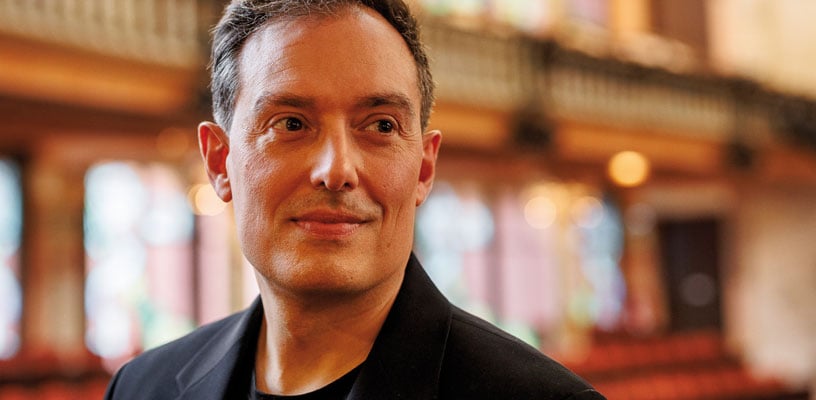Ferran Cruixent: the orchestra launches into the metaverse

In his Metaverse cycle, Ferran Cruixent explores the fascination, but also the threat, of the virtual world that surrounds us. The third and most recent part of the series is a work for large orchestra, receiving its premiere at Córdoba’s Gran Teatro on 18 January.
The latest in Ferran Cruixent’s cycle of works critiquing the virtual world, with all its seductive pleasures but dangerous threats, is Metaverse III for orchestra, which receives its premiere on 18 January by the Orquesta de Córdoba under Pablo Rus. The new work was commissioned by the SGAE Foundation of the General Society of Spanish Authors and Publishers and the Association of Spanish Symphony Orchestras AEOS.
> Visit the Orquesta de Córdoba website
The new 20-minute orchestral work is "dedicated to the ELIZA effect", i.e. the supposed humanisation of robots, algorithms and AI. Metaverse III continues the series of compositions following Metaverse I for baritone and string quartet and Metaverse II for choir a cappella (both 2022), all of which question the relationship between humans and technology.
Metaverse III is inspired by the obsessive world of video games - the origin of today's metaverse. "Through the fusion of repetitive motivic cells and hypnotic counterpoints with a harmonious, richly coloured lyricism, it transports the audience into an almost liturgical sphere imbued with deep spirituality", as the composer explains in the work’s score.
Although the listener is readily immersed in the fascinations of the metaverse, the composition also imagines its hidden brutal side: the true world of obsessive data transfer. The highly chromatic third of the four parts of the score, titled after Rainer Werner Fassbinder's dystopian TV mini-series Welt am Draht (World on a Wire) from 1973, culminates "in a perverse, diabolical climax".
In addition to their instrumental 'tasks', the orchestral musicians not only have to recite text, they also have to ‘cybersing’ - a technique first introduced in Cruixent's symphonic work Cyborg in 2010. They play audio files on mobile phones (as a metaphor for virtual communication), establishing a new, direct possibility of interaction between interpreter and composer beyond the score. In Metaverse III, electronic sounds imitating earlier motifs of the work are reproduced; they blend with the conventionally produced sounds to create "a poetic galaxy that blurs the boundary between the real and the synthetic".
Cruixent’s percussion concerto Focs d'artifici, with its sparkling depiction of fireworks, receives performances in Turkey and German over the coming months. The Bilkent Symphony Orchestra presents the Turkish premiere in Ankara on 3 February conducted by Romain Dumas. This is followed by a performance at the Philharmonie in Berlin by Vanessa Porter and the Deutsches Symphonie-Orchester under Adam Hickox on 28 February, with a broadcast following on Deutschlandfunk Kultur. Kai Strobel is soloist again on 20 April for a performance by the Nuremburg Symphony conducted by Gordon Hamilton.
> Focs d'artifici at the Berlin Philharmonie
> Further information on Work: Metaverse III
Photo: Quim Roser
